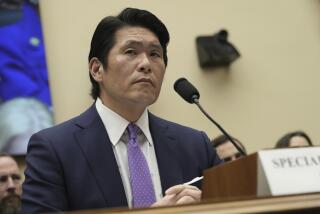The Harman file
- Share via
The recent allegations against Rep. Jane Harman (D-Venice) are tangled and murky and, for the moment at least, raise more questions than they answer -- but they’re also troubling. If everything that’s alleged turns out to be true, it’s not a nice story.
Let us recap. In 2005, two employees of the American Israel Public Affairs Committee, the leading pro-Israel lobby in the U.S., were charged with conspiring to obtain classified information from a Defense Department official and passing it on to an Israeli Embassy official. Their espionage trial is scheduled for June.
This week, Congressional Quarterly reported that Harman spoke on the phone in 2005 or 2006 with an ally of the two AIPAC officials and promised to seek lenient treatment for them. In return, she was reportedly offered help winning the chair of the House Intelligence Committee, a job she badly wanted. Harman apparently signed off the call saying, “This conversation doesn’t exist.”
But it now appears that the conversation, or some version of it, does exist -- and was captured on tape by the National Security Agency as part of a court-approved wiretapping investigation into Israeli spying in the U.S. Harman was not the target, but her interlocutor was.
What are we to make of this? Harman says it’s outrageous that she was eavesdropped on, that she never sought to influence the AIPAC case, and that the tapes should be released. We certainly support that last request. There are plenty of contradictions in these reports, and a transcript, along with an explanation from the executive branch, could clear up a lot of questions.
Harman was within bounds to argue that the AIPAC prosecution was unfair. But if she actually agreed to contact senior officials to influence an ongoing criminal case, that’s a touchier subject -- and it’s totally unacceptable if she agreed as part of a quid pro quo to win a job. Even though she never became chairwoman, and there’s no evidence she influenced anyone, the conversation, if it occurred, is very disturbing.
Here’s another twist. After the conversation was intercepted, a review was begun to decide whether a criminal inquiry was warranted. But it was halted, says CQ, by then-Atty. Gen. Alberto R. Gonzales, who wanted Harman’s help in dissuading the New York Times from writing about the controversial warrantless wiretapping program. If that’s true, it’s outrageous too. The attorney general should not be closing investigations because he needs “help” from their targets.
What’s obvious is that politics and personal agendas should never impede serious law enforcement. We will reserve final judgment until we see the transcripts. But it doesn’t sound as if anyone is going to come out looking good.
More to Read
Sign up for Essential California
The most important California stories and recommendations in your inbox every morning.
You may occasionally receive promotional content from the Los Angeles Times.










